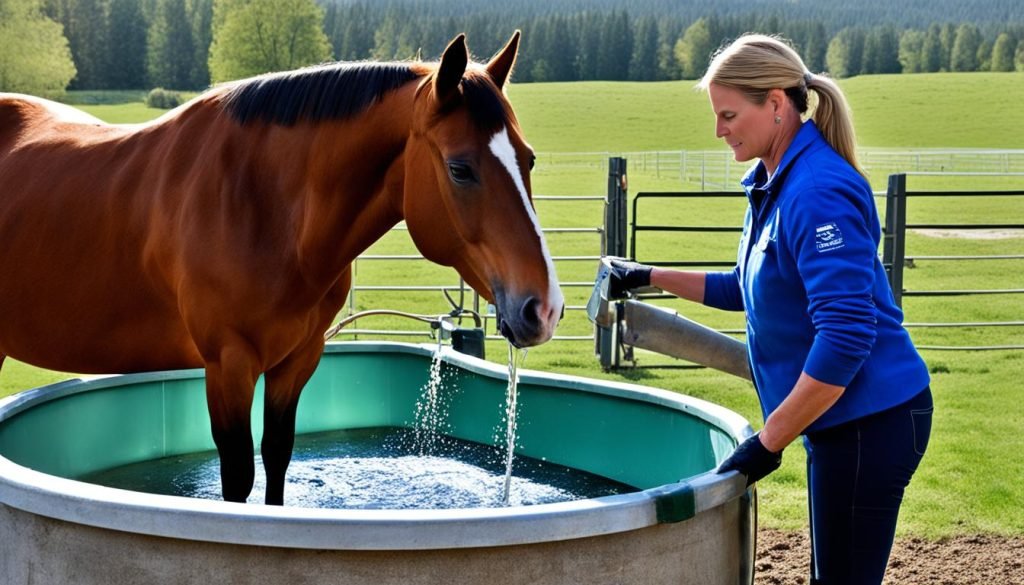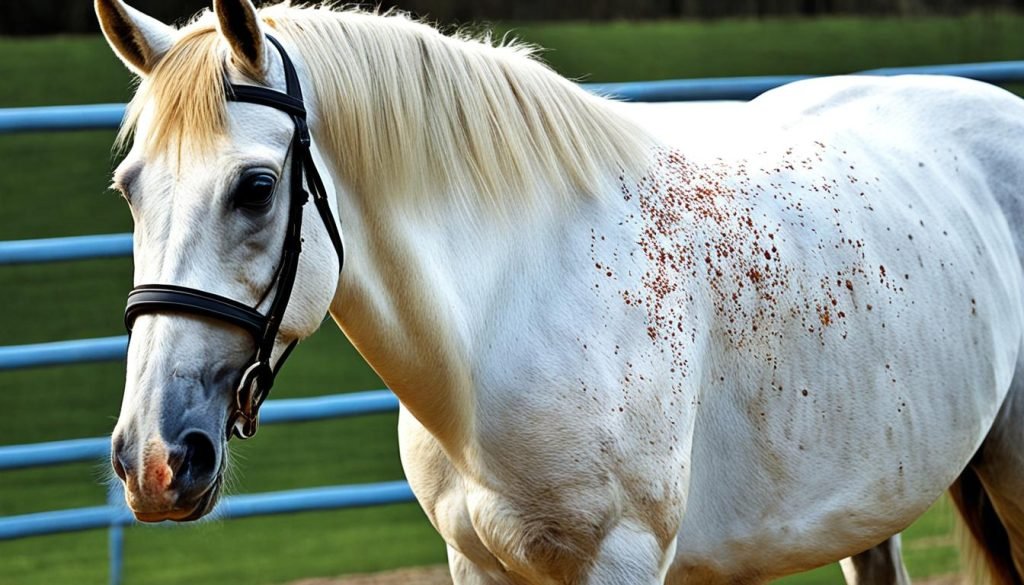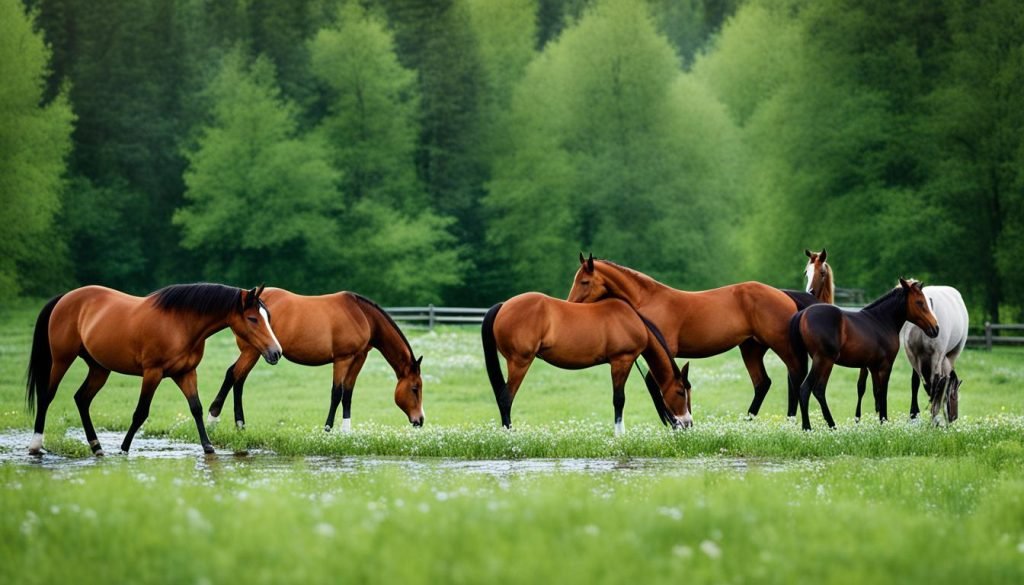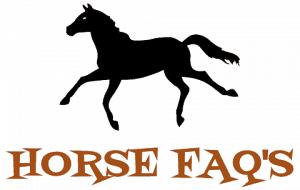Did you know that nearly 60% of performance horses experience some form of gastric ulcers during their lifetime? This startling statistic underscores the importance of diligent equine healthcare. Ensuring the well-being of horses involves a comprehensive approach to managing a range of horse diseases such as arthritis, colic, laminitis, and respiratory issues. To safeguard your horse’s health, it is crucial to recognize early signs of trouble, from subtle changes in behavior to more evident symptoms like loss of appetite or lameness.
Prevention is key, and this means focusing on preventative care, which includes maintaining proper hoof care, balanced nutrition management, effective parasite control, adherence to vaccination schedules, stable hygiene, and regular exercise routines. Creating an environment that meets the horse’s need for continuous grazing, social interaction, and movement can prevent many health issues caused by boredom and stress.
Key Takeaways
- Diverse horse diseases like arthritis, colic, and respiratory issues can be prevalent.
- Early detection of health issues is crucial through observing changes in behavior and physical symptoms.
- Preventative care encompasses hoof care, nutrition management, and consistent exercise routines.
- Effective parasite control and adherence to vaccination schedules are vital components of equine healthcare.
- Maintaining excellent stable hygiene and providing a stress-free environment support overall horse well-being.
Understanding Equine Ulcers
Equine ulcers, particularly gastric ulcers in horses, are a significant concern in horse healthcare, especially for those involved in competitions and racing. Understanding the causes, symptoms, and preventative measures is crucial for effective management.
https://www.youtube.com/watch?v=1hUXgkIjEdY
Causes of Equine Ulcers
Gastric ulcers in horses often result from extended periods without forage, allowing stomach acid to damage the lining of the stomach. Other causes include high-grain diets, stress from frequent travel and competition, and insufficient equine nutrition. Maintaining regular feeding schedules and providing continuous access to forage can mitigate risks.
Symptoms to Watch For
Horses suffering from equine ulcers may exhibit various symptoms such as behavioral changes, reduced appetite, weight loss, and a decline in overall performance. Prompt recognition of these symptoms allows for early intervention and more effective treatment. Monitoring horses for these signs is an essential part of routine horse healthcare.
Preventative Measures
Preventing gastric ulcers in horses involves ensuring they have constant access to forage and managing their stress levels. Reducing the frequency of stressful events like transport and competition also helps. Additionally, incorporating lower-calorie feeds at regular intervals supports better equine nutrition, thus reducing ulcer risks.
Omeprazole treatment has shown high efficacy in treating equine ulcers, but the success is enhanced by ongoing diet management and minimizing stress factors. By adopting these preventative measures, horse owners can safeguard their horses’ health and well-being.
Effective Colic Management and Prevention
Colic is a frequently occurring gastrointestinal affliction in horses that demands significant attention due to its potential severity. Effective equine colic management revolves around understanding its common causes, recognizing colic symptoms early, and implementing adequate preventive strategies to maintain optimal equine digestive health.

Common Causes of Colic
Inadequate roughage and dental issues are identified as primary contributors to colic. Without sufficient fiber, the digestive process can become hampered, leading to blockages and discomfort. Additionally, dental problems can prevent proper chewing, thus increasing the risk of gastrointestinal health issues in horses.
Signs of Colic in Horses
Recognizing colic symptoms early is crucial. Indicators include behavioral distress, such as pawing at the ground, rolling, or frequent lying down and getting up. Other signs are visible discomfort, gut pain, an unwillingness to eat, and a cessation of normal activities. Monitoring these cues can aid in early diagnosis and treatment.
Preventative Strategies for Colic
Preventative measures are essential for maintaining equine digestive health. Ensuring a balanced diet with plenty of fiber is paramount. Additionally, keeping horses hydrated and maintaining regular dental check-ups can prevent colic. Implementing strategies like providing clean water and food, making dietary changes gradually, and ensuring freedom of movement can significantly reduce colic risks. In cases of suspected colic, prompt veterinary intervention is vital.
Dealing with Arthritis in Horses
Arthritis in horses, also known as equine arthritis, is a common ailment that manifests as joint inflammation. Often arising from bone or cartilage damage due to injury or infection, it poses significant challenges to horse joint health. Symptoms typically include swelling, warmth, and discomfort during joint flexion, severely affecting mobility.
Although equine arthritis is incurable, the primary objective of management is to minimize discomfort and preserve joint function. Effective management strategies include engaging horses in targeted exercises, maintaining optimal weight, and administering anti-inflammatory medications when necessary.
Preventative measures play a pivotal role in fostering long-term horse joint health and delaying the onset of degenerative joint disease in horses. These measures include:
- Regular exercise to maintain joint mobility
- Proper warm-up routines before engaging in intense activities
- Avoiding overstraining to reduce the risk of early-onset arthritis
Ensuring a well-balanced diet and consistent monitoring of joint health can also contribute to effective arthritis prevention. Regular veterinary checkups enable early detection and timely treatment, thereby enhancing the overall quality of life for our equine companions.
Common Skin Conditions in Horses
Ensuring your horse’s skin health is paramount for their overall well-being. Horses are susceptible to various skin conditions, often caused by fungal or bacterial infections. Key preventive and treatment practices can help ward off these issues and maintain your horse’s dermatological health.
Identifying Ringworm
One of the prevalent fungal infections in horses is ringworm, which typically manifests as raised tufts of hair that eventually develop into bare, circular lesions. Proper diagnosis and treatment are essential to prevent the spread to other horses. Regular grooming and avoiding shared equipment can play a critical role in managing this condition.
Preventing Mud Fever
Mud fever is a challenging condition that generally affects the lower legs and stomach area, especially in wet environments. Symptoms include swollen legs, scabs, and sometimes fever. To mitigate the risk of mud fever, ensure that your horse is kept in a dry, clean environment. Additionally, using barrier creams can help protect the skin from excessive moisture.
Treating Rain Scald
Rain scald, also known as mycotic dermatitis, is another condition that arises from prolonged exposure to wet conditions. This leads to patchy hair loss and lesions on your horse’s back and sides. Treatment involves cleaning the affected areas with anti-fungal washes and ensuring that the horse stays dry. Using clean, individualized tack and providing proper shelter are crucial preventive measures.

Effective management of horse skin conditions, such as those described above, hinges on diligent hygiene practices and appropriate environmental controls. Consulting with a veterinarian frequently ensures that any emerging issues can be addressed promptly, safeguarding your horse’s equine dermatology.
Common Respiratory Conditions and Their Prevention
Understanding common respiratory conditions in horses is crucial for maintaining optimal equine respiratory health. Among these conditions, the common cold in horses and equine herpes virus are particularly prevalent.
Symptoms such as coughing, nasal discharge, fever, and swollen lymph nodes often signal respiratory issues. Effective horse cough management involves isolating new horses, ensuring clean drinking water, and maintaining a clean, dust-free environment.
Vaccination plays a pivotal role in minimizing the risk of both the common cold in horses and the equine herpes virus. Prompt veterinary consultation and early detection are essential to prevent the spread of infection and promote swift recovery.
By adopting these measures, horse owners can significantly reduce the incidence of respiratory problems, thereby fostering better equine respiratory health and wellbeing.
Improving Overall Equine Health: Steps and Strategies
Ensuring optimal health for your horse involves a multifaceted approach that integrates sound nutrition, regular physical activity, and consistent immunization practices. Let’s dive into the key strategies that can bolster your horse’s well-being.
Improving Nutrition Management
Sound equine diet management plays a vital role in maintaining your horse’s overall health. A balanced diet should include a rich supply of forage complemented by appropriate supplements. This not only meets nutritional needs but also supports digestive health. Continuous access to clean water and forage is essential, as it ensures that your horse’s digestive system functions efficiently.
Ensuring Regular Exercise
Implementing consistent horse exercise routines is fundamental in promoting physical and mental well-being. Regular exercise helps in managing weight, preventing joint-related issues like arthritis, and enhancing muscle tone. Activities such as controlled riding, lunging, and even free-running in a field can contribute to a well-rounded exercise plan.
Vaccination Schedules
Adherence to equine immunization protocols is critical to safeguarding your horse against infectious diseases. Working closely with an equine veterinarian to establish a tailored vaccination schedule ensures timely protection against prevalent health threats. These vaccinations form a cornerstone of holistic horse care, preserving your horse’s health.

Conclusion
In summary, fostering equine wellness requires a proactive and comprehensive approach by horse owners. By vigilantly monitoring their horses’ behavior and physical condition, owners can quickly identify potential health concerns. A balanced diet, consistent exercise, and adherence to scheduled vaccinations are paramount in ensuring overall horse health maintenance.
A commitment to comprehensive horse care goes beyond addressing immediate health issues. It encompasses preventive measures, such as maintaining stable hygiene, providing adequate rest, and ensuring continuous access to fresh water and high-quality forage. These actions collectively contribute to a holistic management plan tailored to each horse’s unique needs.
Dedicated equestrian management is a testament to the bond between owner and horse. By prioritizing these preventive and maintenance strategies, horse owners not only enhance the longevity and vitality of their equine companions but also cultivate an environment where these majestic animals can thrive. This dedication ultimately serves to promote a sustainable and fulfilling life for every horse under their care.
FAQ
What are some common horse health issues?
Common horse health issues include arthritis, gastric ulcers, colic, laminitis, respiratory diseases, and skin ailments.
How can I prevent my horse from developing gastric ulcers?
Preventative measures for gastric ulcers include maintaining consistent access to grazing, offering lower-calorie feeds at regular intervals, and managing stressors associated with transportation and competition.
What symptoms should I watch for to detect colic early?
Signs of colic in horses include behavioral anxiety, noticeable gut pain, and changes in usual activities such as eating or movement.
How can I help manage my horse’s arthritis?
Management of equine arthritis involves targeted exercises, weight management, proper warm-up routines before activity, and possibly using anti-inflammatory medications to reduce discomfort and improve joint function.
What are common causes of respiratory conditions in horses?
Respiratory conditions in horses can be caused by viruses like the common cold or equine herpes virus. Preventive measures include vaccination, isolation of new horses, and maintaining clean drinking water sources.
How can I prevent skin conditions such as ringworm, mud fever, and rain scald in my horse?
Preventive actions include maintaining hygiene, using individualized tack, providing appropriate shelter, and ensuring the horse’s environment is dry and clean.
What are key strategies for improving overall equine health?
Key strategies include managing nutrition with a well-balanced diet, ensuring regular exercise, adhering to vaccination schedules, and maintaining a clean and hygienic stable environment.
What should I do if I suspect my horse has colic?
If you suspect your horse has colic, prompt veterinary intervention is vital. Ensure your horse has access to clean water and food, manage dietary changes carefully, and allow freedom of movement to minimize risks.
How can I identify if my horse has a skin condition like ringworm?
Ringworm appears as raised tufts of hair that may evolve into lesions. Maintaining hygiene and using anti-fungal washes can help manage and treat the condition.
What steps can I take to ensure proper nutrition management for my horse?
Ensuring proper nutrition management includes providing a balanced diet rich in forage and appropriate supplementary feeds, tailored to the horse’s age, activity level, and individual health needs.
